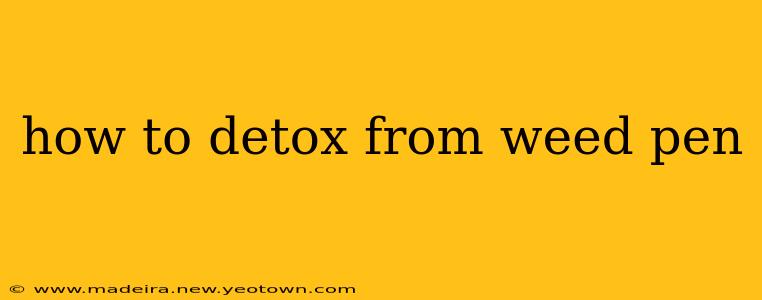How to Detox from Weed Pens: A Holistic Approach to Cleansing Your Body
The journey to detoxing from weed pens, or any cannabis consumption method, isn’t a one-size-fits-all sprint. It’s a marathon, requiring patience, self-compassion, and a multifaceted approach. This isn't about a quick fix; it's about supporting your body's natural detoxification processes and managing any potential withdrawal symptoms. My experience guiding others through similar journeys has taught me the importance of a holistic approach, blending physical strategies with mental and emotional support.
This guide explores effective methods, offering a roadmap to navigate your detox effectively and safely. Remember, always consult with a healthcare professional before starting any detoxification process, particularly if you have pre-existing health conditions or are taking other medications.
What Happens When You Stop Using a Weed Pen?
Before diving into the detox methods, let's address the elephant in the room: withdrawal. The intensity of withdrawal symptoms varies significantly from person to person, depending on factors such as frequency of use, potency of the cannabis, and individual metabolism. Common withdrawal symptoms can include:
- Irritability and mood swings: Feeling agitated, anxious, or experiencing sudden shifts in mood.
- Sleep disturbances: Insomnia, vivid dreams, or difficulty staying asleep.
- Changes in appetite: Increased or decreased appetite, cravings.
- Headaches: Mild to moderate headaches.
- Intense cravings: A strong urge to use cannabis again.
These symptoms are usually temporary, but understanding what to expect can help you manage them more effectively.
How Long Does it Take to Detox from a Weed Pen?
This is a question with no single answer. The time it takes to detox from weed pens depends on multiple factors, including:
- Frequency of use: Daily users will generally take longer to detox than occasional users.
- Potency of the cannabis: Higher potency concentrates from pens mean longer detection times.
- Individual metabolism: Your body's natural ability to process and eliminate substances plays a role.
- Body fat percentage: THC can store in fat cells, prolonging detection.
While THC can be detected in urine for up to 30 days or more in heavy users, the subjective experience of feeling "cleansed" can happen much sooner. The focus shouldn't be solely on test results but on feeling better physically and mentally.
How to Detox from a Weed Pen Naturally?
A natural approach focuses on supporting your body's inherent cleansing mechanisms. This involves a multi-pronged strategy:
- Hydration is Key: Drinking plenty of water is crucial for flushing toxins from your system. Aim for at least eight glasses a day.
- Nutrition is Paramount: A balanced diet rich in fruits, vegetables, and whole grains supports liver function, which is essential for detoxification. Consider adding foods rich in antioxidants and fiber.
- Exercise Regularly: Physical activity boosts metabolism and circulation, aiding in the removal of toxins.
- Prioritize Sleep: Adequate sleep allows your body to repair and rejuvenate, improving overall detoxification.
- Consider Supplements (With Caution): Some people find supplements like milk thistle (supports liver function) or activated charcoal (binds to toxins) helpful. However, always consult a healthcare professional before using any supplements.
Managing Withdrawal Symptoms During Detox
Withdrawal can be challenging. Here are some strategies to help manage the discomfort:
- Stay Hydrated: Dehydration can worsen many withdrawal symptoms.
- Eat Regularly: Maintain consistent meal times to avoid intense cravings.
- Engage in Relaxing Activities: Yoga, meditation, or deep breathing exercises can help reduce anxiety and irritability.
- Get Support: Talk to friends, family, or a therapist about your experience. Support groups can also be incredibly beneficial.
- Seek Professional Help: If withdrawal symptoms are severe or unmanageable, seek professional medical assistance.
What to Expect During and After Detox
Detox is a process, not an event. Expect ups and downs. Be patient with yourself, celebrate small victories, and remember that seeking professional support is a sign of strength, not weakness. After detox, focus on maintaining a healthy lifestyle to minimize the risk of relapse.
Remember, this information is for educational purposes only and should not be considered medical advice. Always consult with a healthcare professional before making any changes to your health routine, especially when considering detoxification from substances.

